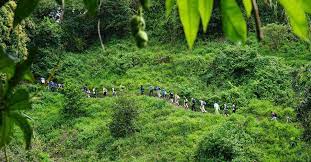COURTESY : ecotourism.org/
ECO-TOUR
Ecotourism is now defined as “responsible travel to natural areas that conserves the environment, sustains the well-being of the local people, and involves interpretation and education” (TIES, 2015). Education is meant to be inclusive of both staff and guests.
Principles of Ecotourism
Ecotourism is about uniting conservation, communities, and sustainable travel. This means that those who implement, participate in and market ecotourism activities should adopt the following ecotourism principles:
- Minimize physical, social, behavioral, and psychological impacts.
- Build environmental and cultural awareness and respect.
- Provide positive experiences for both visitors and hosts.
- Provide direct financial benefits for conservation.
- Generate financial benefits for both local people and private industry.
- Deliver memorable interpretative experiences to visitors that help raise sensitivity to host countries’ political, environmental, and social climates.
- Design, construct and operate low-impact facilities.
- Recognize the rights and spiritual beliefs of the Indigenous People in your community and work in partnership with them to create empowerment.



